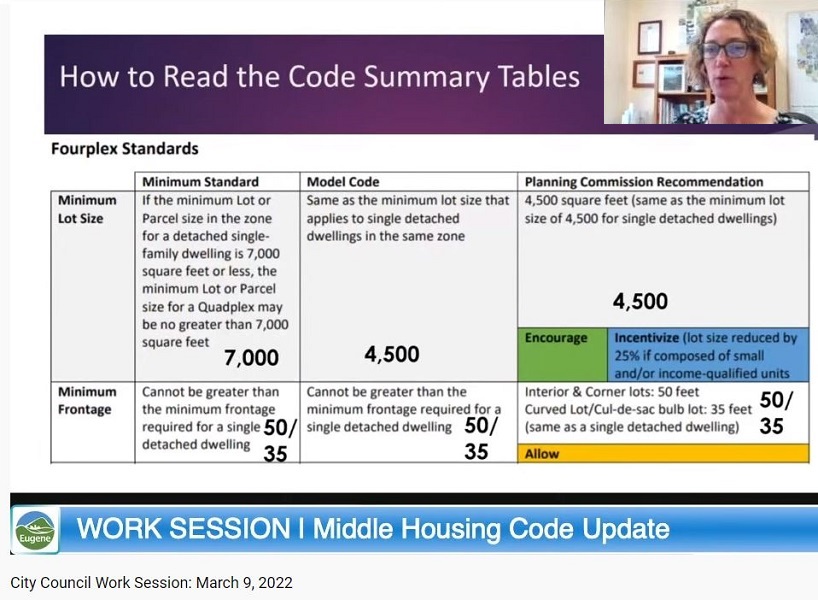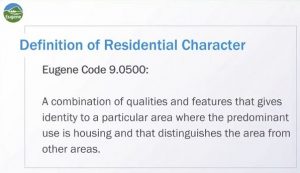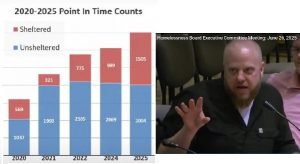City Council hears the latest on Eugene’s approach to HB 2001
6 min read
The City's Terri Harding compared the minimum standards, model code, and Planning Commission recommendations on March 9, 2022.
[00:00:00] John Q: With the clock ticking, City Council heard the latest on HB 2001.
[00:00:05] Terri Harding: I’m Terri Harding, principal planner with the Community Planning and Design team, and we’re here today to talk to you about the middle housing code amendments recommended by the Eugene Planning Commission to implement House Bill 2001.
[00:00:18] Before single family zoning (like Eugene’s R-1 zone) was expanded after World War II across the country, American neighborhoods contained a mix of single houses and other types of housing that fit different households, compositions, and budget needs. The term ‘missing middle housing’ was coined by Daniel Parolek of Opticos Design to describe housing that falls between a single detached unit and an apartment building— …(such as) a fourplex, a duplex and townhomes. Middle housing can be found in many older neighborhoods and historic districts, as well as in newer mixed housing neighborhoods.
Thank you for supporting
local civic journalism
[00:00:50] But until House Bill 2001, new middle housing was difficult to build in large parts of the city, only allowed in certain places, often requiring special permits, public hearings, and discretionary approval processes. …By June 30th of this year, cities with over 25,000 residents must update their zoning to allow a duplex on each lot where a single-family dwelling is allowed; the other middle housing types in residential zones based on the size of a lot.
[00:01:18] John Q: Terri said the public engagement was the most robust and equitable the City has ever done.
[00:01:23] Terri Harding: Strong themes emerge from the outreach done with different groups and the general public: Equity and inclusion, encouraging and incentivizing middle housing across the community; Incentivizing flexibility, model homes, housing near transit, and affordable and lower cost housing. And lastly, pursuing financial incentives and programs beyond the code, such as through the HIP (Housing Implementation Pipeline).
[00:01:44] Now, after those 18 months of state rulemaking and 18 months of local outreach and analysis, the Planning Commission recommendation is coming to you for your consideration.
[00:01:53] John Q: Terri compared the model housing code, the minimum required by HB2001, and areas where Eugene’s code would go beyond both.
[00:02:02] Terri Harding: You are receiving a lot of written testimony about this project that can continue up to, and after the Council public hearing, which is scheduled for April 18th, and then following your public hearings, you have potential action scheduled for May. The code must be in effect prior to June 30th, 2022, or the state’s model code will directly apply in Eugene.
[00:02:25] John Q: City councilors weighed in.
[00:02:28] Councilor Emily Semple: I would like to see us start with the minimum code.
[00:02:31] I just really think that the Planning Commission has gotten too excited and gone full out to everything we could do with this. The state has given us some really big changes that we have to implement. I think it would be wise to start with those, come back in a year, really push the education, and see how it’s working.
[00:02:55] I’m not against the individual ideas, not all of them (some of them against), I think they’re good ideas, but I don’t think we need to start there. I think we need to start at the basis, at the minimum, and then see where Eugene wants to go.
[00:03:12] Councilor Randy Groves: I always try to look for the middle ground if possible on these things. I’m not sure it exists here, although I do like the idea of stepping in at the shallow end and walking towards the deep end, rather than just diving head first into the deep end. But I’m not sure that’s going to happen in this case.
[00:03:29] It just seems like there’s a lot of concern about this, like I said, on both sides, but I would certainly like to have a better understanding of the consequences for these decisions. It’s, we definitely need more housing. I understand that. I support that. But I also think maintaining livability in our neighborhoods is important as well.
[00:03:50] Councilor Mike Clark: When you have a public that’s more, better informed on a broader scale, you have less opportunity for conflict… It’s hard to misinform people who are already well-informed. And so if we had started with a process that did—if we knew a year ago, this one’s going to be a heavy lift, we’re going to have a lot of public education to do about the minimums, about how our goals intersect with that, about why we’re going to do what we’re going to do, I think we’d have less potential now for the hundreds and hundreds of emails we’re getting with people concerned. So I am hoping that as we go towards the finish line here, we do more public engagement.
[00:04:33] Councilor Claire Syrett: I am actually very satisfied with the recommendations of the Planning Commission. I don’t think we should limit ourselves to the minimum standards. I’m not opposed to looking at some of the particulars that other councilors might want to tweak, but I am not going to support just doing the minimum or having a cookie-cutter model code imposed on us.
[00:04:53] I think the alarmist nature of the information being put out by some members of the community creates the impression that, should we adopt this code, whole neighborhoods will be bulldozed in the next year or two. And that is absolutely not the case. There will be some changes on some blocks of some neighborhoods and over time, there will be a different mix of housing in our community.
[00:05:17] Councilor Alan Zelenka: I have a request for additional information from staff for some information around how the quarter mile from a transit corridor for the incentives on parking in particular and half mile from EmX can be looked at more surgically and customized.
[00:05:33] One of the things I didn’t like about HB 2001 was its cookie-cutter approach to all of this and not all neighborhoods are the same and not all the impacts are the same.
[00:05:43] For instance, I think in the University neighborhood this is going to demo (demolish) all affordable housing. We’re going to get more dense market rate housing and do the opposite of what we’re trying to do in terms of getting more affordable housing choices.
[00:05:55] Same with the cookie-cutter-ness of the quarter mile, half mile rule. We’re just applying that, blanket. I’d like to see us do a more customized approach that actually takes into consideration the on-the-ground circumstances and the impacts on the neighborhood especially as it relates to parking.
[00:06:14] Half a mile from an EmX where no parking is required for certain developments is a pretty big impact on neighborhoods, if everybody’s parking on the streets and there’s more density.
[00:06:23] And then for example, half a mile from Franklin for the EmX corridor, or half a mile from a transit corridor, like on Hilyard into the, four blocks into the neighborhoods, and Amazon neighborhood, that’s a pretty big impact. Maybe it should only be one or two blocks.
[00:06:40] Or on 30th Avenue, which is another corridor. It’s just a quarter mile below that, the street right below that, you can’t actually access 30th Avenue. You have to go all the way around to get there. And that’s, so that doesn’t even make sense that the quarter mile applies there because you can’t walk a quarter mile to get to the transit corridor.
[00:06:59] So I’d like to see us approach that’s more customized, more taking into consideration the specific on-the-ground impacts to the neighborhoods and do away with the cookie-cutter approach, do it more that takes into consideration the neighborhoods and the impacts.
[00:07:16] John Q: Mayor Lucy Vinis praised the councilors, Planning Commission, and staff.
[00:07:21] Mayor Lucy Vinis: … So as councilors, I honor all of you for doing your part to really understand this information and then impart clarity, share your clarity with your constituents about where they’re rising to a level of anxiety about this. I don’t think there’s going to be a sudden dramatic abolishing of certain neighborhoods because of this.
[00:07:44] …And the conversation continues and really want to appreciate the work that the planning commissioners have done on this, and the work Terri (Harding) and Jeff (Gepper) and who else am I missing? I see Sophie (McGinley) there, other staff that and Lauren (Sommers) who have tried to bring this home for us.
[00:08:00] John Q: With a wild public discussion already underway, the Council looks toward a public hearing on April 18.



